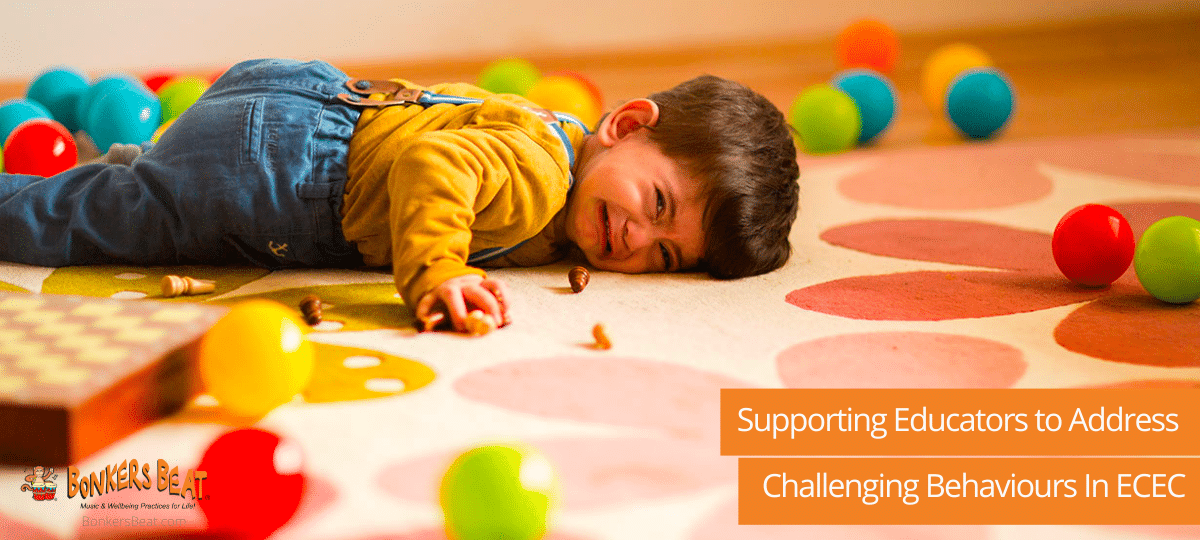Bonkers Beat believes that cultivating an environment which supports the social and emotional growth of young children is paramount. Of course, as part of this, challenging behaviours can be a common aspect of early childhood development.
There are many effective strategies and techniques that emphasise positive reinforcement, empathy, and understanding that educators can use to effectively manage and redirect challenging behaviours, fostering a positive and supportive learning environment.
Understanding the Roots of Challenging Behaviours
To effectively address challenging behaviours in early childhood education, it is crucial to first understand their underlying causes.
There are many reasons for any kind of less-than-desirable behaviour in young children. It could be:
-A means of expressing their needs or emotions (e.g. tiredness, hunger or feeling overwhelmed)
-A way of seeking attention (wanting to feel affection, play a certain game)
By recognising the potential triggers and understanding the child’s perspective, educators can respond appropriately and with empathy.
It is also important to consider children who may have underlying behavioural disorders that contribute to their actions. Conditions such as attention deficit hyperactivity disorder (ADHD), autism spectrum disorder (ASD), or oppositional defiant disorder (ODD) can manifest as challenging behaviours in young children.
Implementing individualised behaviour plans or intervention strategies can greatly benefit children in many instances. In the case of behavioural disorders, these plans should be created in collaboration with professionals and tailored to the child’s unique needs.
Consistency, structure, and clear expectations are key components of such plans, along with incorporating positive reinforcement, empathy, and understanding.
Key Ways to Handle Challenging Behaviours
So, what are some ways you can support children and educators when it comes to behaviours that might be tested? Here are a few broad approaches you can incorporate or reinforce in your early childhood education environment:
Focus on Positive Reinforcement: Positive reinforcement is a powerful tool for managing challenging behaviours. In essence, this is all about educators acknowledging and praising positive behaviours in a bid to encourage children to repeat them.
When offering praise, make it specific — this will have a big impact on building self-esteem for children. For example: “I love the way you waited so patiently for your turn”.
By reinforcing positive behaviours, educators can create a supportive atmosphere that encourages children to make better choices that they feel good about.
Encouraging Emotional Expression and Self-Regulation: Young children often struggle with expressing their emotions effectively (the same goes for adults sometimes too!). It is vital to teach appropriate ways to express and regulate their feelings.
Creating a safe and accepting environment where children are encouraged to communicate their emotions fosters emotional development. Try taking the time to help children to name their emotions. Evidence has shown that naming a feeling can help it to feel less intense and support self-regulation. You can also implement activities such as storytelling, art, and role-playing to guide children to understand and manage their emotions in a healthy way.
Redirecting and Teaching Problem-Solving Skills: Redirecting children’s behaviour is a proactive and effective approach to addressing challenging behaviours. Guiding children towards alternative behaviours and teaching problem-solving skills empowers them to make positive choices.
Encouraging children to think critically and find solutions also helps to develop their cognitive and social-emotional skills, allowing them to navigate challenging situations effectively now and well into the future.
Incorporating Music to Enhance Engagement and Smooth Transitions: Music is a powerful tool to enhance children’s engagement as well as make transitions smooth and fun. Incorporating spontaneous regular singing of nursery rhymes and transitional songs helps reduce anxiety and stress.
Repetition is the key! At Bonkers Beat we use music for every occasion and believe that singing is one of the greatest strategies to handle challenging behaviours.
Here is the link to the transitional songs and free resources for you to try with your children.
Empathy and Kindness are Keys
Testing behaviour can be overwhelming for educators and upsetting for the children and families too. Addressing challenging behaviours in early childhood requires a holistic approach that emphasises understanding and kindness always.
Take the time to connect with your team of educators and work together, along with families, to pave the way for managing behaviour both empathetically and effectively.





